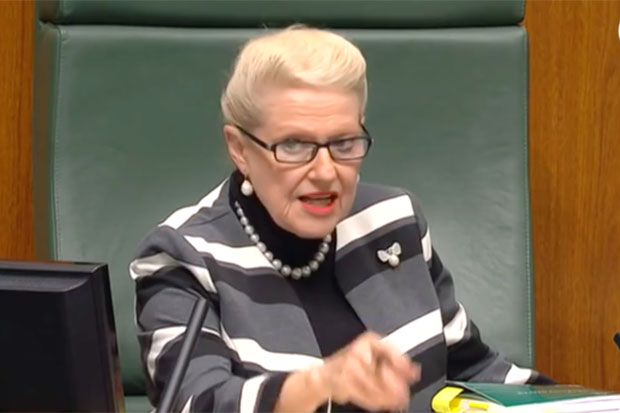Bronwyn Bishop has departed. The Speaker of the House of Representatives resigned on the weekend, after the negative publicity regarding her exorbitant travel claims got the better of her.
There can be no doubt that Prime Minister Tony Abbott pushed her out. After standing by the embattled Speaker for the best part of a month, the ongoing travel expenses scandal was threatening to derail his entire agenda. Most notably, the Prime Minister had a trip booked to South Australia, where the Coalition is in desperate trouble in opinion polls.
Bishop should have gone weeks ago, as we argued at New Matilda on July 16.
Instead, the Bishop saga has dragged on. The recalcitrant Speaker dug her heels in, refusing to resign until pushed. Abbott prevaricated instead of pulling the plug.
As a result, the government has spent much of the past three weeks defending the indefensible. It’s been a very poor look for a government that is already struggling.
Bishop’s career is over. The Speakership was something of a victory lap anyway – few expected her to stay on past the next election. She will remain the Member for Mackellar for the time being. But the Liberal Party will inevitably move to pre-select someone else for her safe seat. Few of her colleagues seem to be mourning her downfall.
As her biographer David Leser wrote this morning, there is plenty of irony here. “Bishop rose to national prominence on the issue of public accountability,” he reminded us. “Her forum was Senate estimates and joint public accounts committee hearings, and her quarry, public servants who had the misfortune to appear before her.”
The political damage has accrued mostly to the Prime Minister. Bishop was his choice for the pivotal role of Speaker. Now she looms as yet another of Abbott’s disastrous captain’s calls. Like so many of Abbott’s personal decisions since becoming Prime Minister, this one has backfired disastrously. The rumblings on the Liberal backbench will therefore continue.
A bad situation has been made worse by the Prime Minster’s own dubious entitlement claims. Tony Abbott has claimed travel expenses for appearing in the annual Pollie Pedal charity bike ride. He has already racked up a higher entitlements bill than Julia Gillard, despite spending less time in the job. And he has done so at the helm of a government that has run massive budget deficits while lecturing Australians on being “lifters, not leaners”.
Even Abbott has had to acknowledge, therefore, that the scandal has hurt him.
“The government has inevitably paid a price and I dare say there will be a little personal price for me but let’s not forget that, while Bronwyn has made some very serious mistakes, ultimately she was the one who paid the highest price,” Abbott said today.

Abbott’s comments underline how tricky the entitlements controversy is for sitting politicians. The public has a passionate hatred for political perks and rorts, and Parliamentary travel entitlements have long been an open sewer from whence a malodorous stench has drifted.
After all, you could argue that the “highest price” has been the one paid by taxpayers, who have funded all manner of helicopter flights, limousine rides and first class airline tickets.
As Paula Matthewson pointed out yesterday, “the culture of privilege among parliamentarians appears to be entrenched and in urgent need of addressing.” She observed that no fewer than 72 allegations of entitlement abuse have been lodged with the Department of Finance between August 2009 and June 2014.
Now Abbott has promised a review of the travel entitlements system. Not before time. A far simpler and more transparent process is required. No-one denies that politicians need to travel to represent their constituents. But when entitlements are abused in such an unabashed fashion, democracy itself is tarnished.
The Bishop imbroglio also highlights some uncomfortable patterns in Tony Abbott’s leadership: his listless crisis management, his reflexive loyalty to under-performing colleagues, and the lack of a concrete re-election agenda.
Abbott was in South Australia this week, promising new frigates would be built in Adelaide’s shipyards. But the announcement only served to highlight the running sore of the government’s procrastination on future submarines. South Australians want them built in South Australia, and the Coalition promised to do so before the election. Since winning office, the government has instead refused to sign any contracts, hinting they’ll be built in Japan instead.
Worse, even after Bishop’s resignation, the travel scandal overshadowed the frigates announcement. As a result, the government has missed out on much of the positive media coverage it would normally have expected from such a big spending announcement.
But what is the Abbott government’s agenda, beyond frigates? The terror scare has demonstrably failed. The budget, supposedly such a boon to small business, has largely been forgotten. The government has signed a new free trade deal with China, but the public doesn’t much like free trade deals anyway.
The candidates for further reforms don’t look promising. Tax reform seems off the table. The Coalition would like to have a go at industrial relations, but realises how risky that would be.
In a similar situation in his first term, John Howard gambled big on a sweeping reform to Australia’s taxation system: the GST. Few believe Tony Abbott has the courage to try something like that.
The next federal election is perhaps only 14 months away. If Abbott has a positive agenda for his second term, now is the time to unveil it.
The good ship Coalition is therefore adrift. There are doubts about the judgment of the captain, and the crew is increasingly restless. There could be more heavy weather ahead.
Donate To New Matilda
New Matilda is a small, independent media outlet. We survive through reader contributions, and never losing a lawsuit. If you got something from this article, giving something back helps us to continue speaking truth to power. Every little bit counts.




